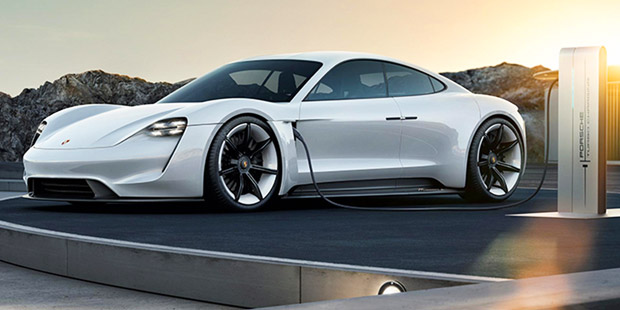
Porsche on Friday revealed plans to produce its first 100 percent electrically powered sports car under its Mission E project by the end of the decade.
The Mission E concept car debuted at the Frankfurt International Motor Show earlier this year. The four-door vehicle utilizes a system power output that exceeds 440 kW and can accelerate from 0 to 100 kph in about 3.5 seconds, Porsche said.
The concept vehicle, which is charged via an 800-volt charger unit, has a range of 500 kilometers. Via a quick-charge system, its lithium-ion batteries can be bought to 80 percent power in about 15 minutes.
The final production models will be capable of recharging wirelessly via induction with a coil-based system that could be installed under its parking spot in a garage.
Green Light
Mission E, which was given the green light by the company’s supervisory board, could create more than 1,000 new jobs at the company’s offices and development facilities in Stuttgart-Zuffenhausen, according to Porsche.
The company also will invest around US$762 million at its main site and in the coming years will build an assembly plant and paint shop, while the existing engine factory will be expanded to handle the production of electric motors.
“With Mission E, we are making a clear statement about the future of the brand,” said Wolfgang Porsche, chairman of Porsche’s supervisory board. “Even in a greatly changing motoring world, Porsche will maintain its front-row position with this fascinating sports car.”
Sports Market
Porsche’s entry into the electric vehicle market might not be a major disrupter to the mainstream driver end of the market, where companies such as Honda and Ford are seeking to gain traction.
However, it could edge out Tesla, “which has owned the luxury as well as the sport market,” said Devin Lindsay, principal analyst at IHS Automotive.
Tesla’s Model S has made headlines as a sports car, with its ability to race from 0 to 60, he told TechNewsWorld.
That probably caught the attention of Porsche, which likely doesn’t want to give up any of its share in the high-end sports car market.
Challenges in the Market
Porsche’s move likely will be a costly one as it must retool its plants, retrain workers and make a substantial R&D investment. However, this is a company that has built its reputation on quality more than quantity — and it has developed many concept vehicles as well as race-specific vehicles that are more about building the brand than moving product.
Shifting gears to an electric vehicle might not be as challenging as one might expect, said Lindsay.
“In delivery of performance, it is less complex to deliver with an electric vehicle than internal combustion engine,” he noted.
“Engineers will already know what they can expect from the torque, while it might be easier to move a battery pack around the vehicle for weight distribution than it is to move a gasoline-powered engine,” Lindsay added. “With an EV, they have a good idea of what they are going to get out of it.”
Risks and Reward
The biggest risk will be in R&D costs, which might not translate into sales. Those risks could be outweighed by the rewards.
“In terms of OEMs, Porsche already is used to producing some low-volume-selling vehicles,” said Lindsay.
“However, a lot of the technology that goes into developing those cars is used down the line in the [automobiles] that do sell in larger numbers,” he added.
Some of these may filter into its partner brands that include Bentley, Bugatti, Lamborghini, Audi, Skoda and most notably Volkswagen, Porsche’s parent company.
The Car Guy’s Car
Porsche also could be well positioned against its rivals because it still will be seen as a traditional sports car maker that is producing an electric vehicle instead of being a tech company that is producing an electric sports car.
“The Porsche electric car both helps and hurts Tesla,” said Rob Enderle, principal analyst at the Enderle Group.
“It helps because it validates the all-electric segment and should improve the electric charging ecosystem. It hurts because it is a direct competitor to Tesla’s highest-volume offering,” he told TechNewsWorld.
Moreover, Porsche sells through a stronger dealer structure and in larger parts of the country than Tesla, while it also has deeper pockets and knows how to make a better full-spectrum performance car.
“More people should want the Porsche, more people should be able to easily buy it, and the Porsche should test better by car and consumer magazines. The Porsche looks more like an exotic performance car,” added Enderle.
“Tesla is going to have to up their game a lot and likely get a strong partner in order to weather this entry, but this will strengthen the electric car segment significantly,’ he said.
Porsche’s EV thus could appeal to the so-called “car guys” who have steered away from Tesla, which could be seen as a tech company making an EV.
“That is a big part of it for Porsche,” said IHS Automotive’s Lindsay.
“Tesla is for a limited audience, and there are Porsche fans that have been fans their whole life and this is a way to get an electric car where they can trust the performance and the quality,” he added. “Porsche can capture or at least maintain that audience.”
[“source-technewsworld”]














